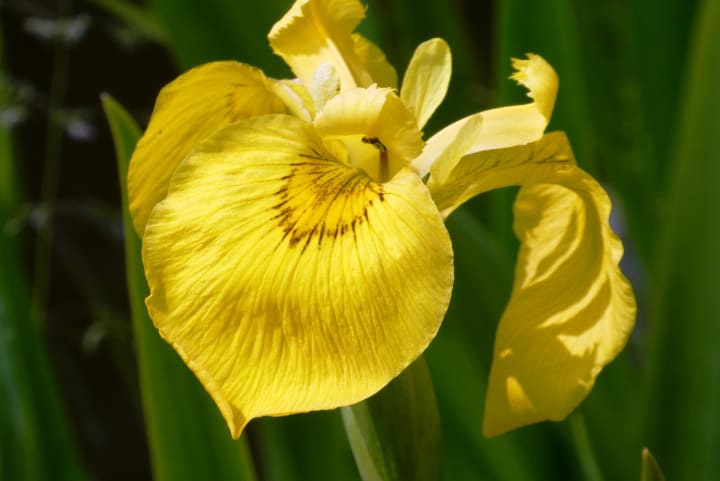Love Among the Haystacks. Chapter.05
By David Herbert Lawrence

It was breaking cold dawn when Geoffrey woke. The woman was still sleeping in his arms. Her face in sleep moved all his tenderness: the tight shutting of her mouth, as if in resolution to bear what was very hard to bear, contrasted so pitifully with the small mould of her features. Geoffrey pressed her to his bosom: having her, he felt he could bruise the lips of the scornful, and pass on erect, unabateable. With her to complete him, to form the core of him, he was firm and whole. Needing her so much, he loved her fervently.
Meanwhile the dawn came like death, one of those slow, livid mornings that seem to come in a cold sweat. Slowly, and painfully, the air began to whiten. Geoffrey saw it was not raining. As he was watching the ghastly transformation outside, he felt aware of something. He glanced down: she was open-eyed, watching him; she had golden-brown, calm eyes, that immediately smiled into his. He also smiled, bowed softly down and kissed her. They did not speak for some time. Then:
"What's thy name?" he asked curiously.
"Lydia," she said.
"Lydia!" he repeated, wonderingly. He felt rather shy.
"Mine's Geoffrey Wookey," he said.
She merely smiled at him.
They were silent for a considerable time. By morning light, things look small. The huge trees of the evening were dwindling to hoary, small, uncertain things, trespassing in the sick pallor of the atmosphere.
There was a dense mist, so that the light could scarcely breathe. Everything seemed to quiver with cold and sickliness.
"Have you often slept out?" he asked her.
"Not so very," she answered.
"You won't go after him?" he asked.
"I s'll have to," she replied, but she nestled in to Geoffrey. He felt a sudden panic.
"You musn't," he exclaimed, and she saw he was afraid for himself. She let it be, was silent.
"We couldn't get married?" he asked, thoughtfully.
"No."
He brooded deeply over this. At length:
"Would you go to Canada with me?"
"We'll see what you think in two months' time," she replied quietly, without bitterness.
"I s'll think the same," he protested, hurt.
She did not answer, only watched him steadily. She was there for him to do as he liked with; but she would not injure his fortunes; no, not to save his soul.
"Haven't you got no relations?" he asked.
"A married sister at Crick."
"On a farm?"
"No—married a farm labourer—but she's very comfortable. I'll go there, if you want me to, just till I can get another place in service."
He considered this.
"Could you get on a farm?" he asked wistfully.
"Greenhalgh's was a farm."
He saw the future brighten: she would be a help to him. She agreed to go to her sister, and to get a place of service—until Spring, he said, when they would sail for Canada. He waited for her assent.
"You will come with me, then?" he asked.
"When the time comes," she said.
Her want of faith made him bow his head: she had reason for it.
"Shall you walk to Crick, or go from Langley Mill to Ambergate? But it's only ten mile to walk. So we can go together up Hunt's Hill—you'd have to go past our lane-end, then I could easy nip down an' fetch you some money," he said, humbly.
"I've got half a sovereign by me—it's more than I s'll want."
"Let's see it," he said.
After a while, fumbling under the blanket, she brought out the piece of money. He felt she was independent of him. Brooding rather bitterly, he told himself she'd forsake him. His anger gave him courage to ask:
"Shall you go in service in your maiden name?"
"No."
He was bitterly wrathful with her—full of resentment.
"I bet I s'll niver see you again," he said, with a short, hard laugh. She put her arms round him, pressed him to her bosom, while the tears rose to her eyes. He was reassured, but not satisfied.
"Shall you write to me to-night?"
"Yes, I will."
"And can I write to you—who shall I write to?"
"Mrs Bredon."
"'Bredon'!" he repeated bitterly.
He was exceedingly uneasy.
The dawn had grown quite wan. He saw the hedges drooping wet down the grey mist. Then he told her about Maurice.
"Oh, you shouldn't!" she said. "You should ha' put the ladder up for them, you should."
"Well—I don't care."
"Go and do it now—and I'll go."
"No, don't you. Stop an' see our Maurice, go on, stop an' see him—then I s'll be able to tell him."
She consented in silence. He had her promise she would not go before he returned. She adjusted her dress, found her way to the trough, where she performed her toilet.
Geoffrey wandered round to the upper field. The stacks looked wet in the mist, the hedge was drenched. Mist rose like steam from the grass, and the near hills were veiled almost to a shadow. In the valley, some peaks of black poplar showed fairly definite, jutting up. He shivered with chill.
There was no sound from the stacks, and he could see nothing. After all, he wondered, were they up there. But he reared the ladder to the place whence it had been swept, then went down the hedge to gather dry sticks. He was breaking off thin dead twigs under a holly tree when he heard, on the perfectly still air: "Well I'm dashed!"
He listened intently. Maurice was awake.
"Sithee here!" the lad's voice exclaimed. Then, after a while, the foreign sound of the girl:
"What—oh, thair!"
"Aye, th' ladder's there, right enough."
"You said it had fall down."
"Well, I heard it drop—an' I couldna feel it nor see it."
"You said it had fall down—you lie, you liar."
"Nay, as true as I'm here—"
"You tell me lies—make me stay here—you tell me lies—" She was passionately indignant.
"As true as I'm standing here—" he began.
"Lies!—lies!—lies!" she cried. "I don't believe you, never. You mean, you mean, mean, mean!"

"A' raïght, then!" he was now incensed, in his turn.
"You are bad, mean, mean, mean."
"Are yer commin' down?" asked Maurice, coldly.
"No—I will not come with you—mean, to tell me lies."
"Are ter commin' down?"
"No, I don't want you."
"A' raïght, then!"
Geoffrey, peering through the holly tree, saw Maurice negotiating the ladder. The top rung was below the brim of the stack, and rested on the cloth, so it was dangerous to approach. The Fräulein watched him from the end of the stack, where the cloth thrown back showed the light, dry hay. He slipped slightly, she screamed. When he had got on to the ladder, he pulled the cloth away, throwing it back, making it easy for her to descend.
"Now are ter comin'?" he asked.
"No!" she shook her head violently, in a pet.
Geoffrey felt slightly contemptuous of her. But Maurice waited.
"Are ter comin'?" he called again.
"No," she flashed, like a wild cat.
"All right, then I'm going."
He descended. At the bottom, he stood holding the ladder.
"Come on, while I hold it steady," he said.
There was no reply. For some minutes he stood patiently with his foot on the bottom rung of the ladder. He was pale, rather washed-out in his appearance, and he drew himself together with cold.
"Are ter commin', or aren't ter?" he asked at length. Still there was no reply.
"Then stop up till tha'rt ready," he muttered, and he went away. Round the other side of the stacks he met Geoffrey.
"What, are thaïgh here?" he exclaimed.
"Bin here a' naïght," replied Geoffrey. "I come to help thee wi' th' cloth, but I found it on, an' th' ladder down, so I thowt tha'd gone."
"Did ter put th' ladder up?"
"I did a bit sin."
Maurice brooded over this, Geoffrey struggled with himself to get out his own news. At last he blurted:
"Tha knows that woman as wor here yis'day dinner—'er come back, an' stopped i' th' shed a' night, out o' th' rain."
"Oh—ah!" said Maurice, his eye kindling, and a smile crossing his pallor.
"An' I s'll gi'e her some breakfast."
"Oh—ah!" repeated Maurice.
"It's th' man as is good-for-nowt, not her," protested Geoffrey. Maurice did not feel in a position to cast stones.
"Tha pleases thysen," he said, "what ter does." He was very quiet, unlike himself. He seemed bothered and anxious, as Geoffrey had not seen him before.
"What's up wi' thee?" asked the elder brother, who in his own heart was glad, and relieved.
"Nowt," was the reply.
They went together to the hut. The woman was folding the blanket. She was fresh from washing, and looked very pretty. Her hair, instead of being screwed tightly back, was coiled in a knot low down, partly covering her ears. Before, she had deliberately made herself plain-looking: now she was neat and pretty, with a sweet, womanly gravity.
"Hello. I didn't think to find you here," said Maurice, very awkwardly, smiling. She watched him gravely without reply. "But it was better in shelter than outside, last night," he added.
"Yes," she replied.
"Shall you get a few more sticks?" Geoffrey asked him. It was a new thing for Geoffrey to be leader. Maurice obeyed. He wandered forth into the damp, raw morning. He did not go to the stack, as he shrank from meeting Paula.
At the mouth of the hut, Geoffrey was making the fire. The woman got out coffee from the box: Geoffrey set the tin to boil. They were arranging breakfast when Paula appeared. She was hatless. Bits of hay stuck in her hair, and she was white-faced—altogether, she did not show to advantage.
"Ah—you!" she exclaimed, seeing Geoffrey.
"Hello!" he answered. "You're out early."
"Where's Maurice?"
"I dunno, he should be back directly."
Paula was silent.
"When have you come?" she asked.
"I come last night, but I could see nobody about. I got up half an hour sin', an' put th' ladder up ready to take the stack-cloth up."
Paula understood, and was silent. When Maurice returned with the faggots, she was crouched warming her hands. She looked up at him, but he kept his eyes averted from her. Geoffrey met the eyes of Lydia, and smiled. Maurice put his hands to the fire.
"You cold?" asked Paula tenderly.
"A bit," he answered, quite friendly, but reserved. And all the while the four sat round the fire, drinking their smoked coffee, eating each a small piece of toasted bacon, Paula watched eagerly for the eyes of Maurice, and he avoided her. He was gentle, but would not give his eyes to her looks. And Geoffrey smiled constantly to Lydia, who watched gravely.
The German girl succeeded in getting safely into the Vicarage, her escapade unknown to anyone save the housemaid. Before a week was out, she was openly engaged to Maurice, and when her month's notice expired, she went to live at the farm.
Geoffrey and Lydia kept faith one with the other.
About the Creator
Mohammad Arif
I am health professional and freelance writer, who have 4 years of experience in the field of freelance writing. I also offer paraphrasing/rewriting services to my clients.I love to work on subjects like HEALTH & fitness, fashion, travel.






Comments
There are no comments for this story
Be the first to respond and start the conversation.